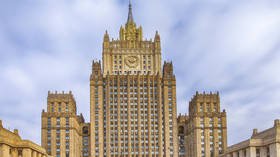UK inflation hits 10-year high

Inflation in Britain surged to 5.1% in November, hitting a high unseen since September 2011, as consumer prices keep increasing ahead of another policy-setting meeting of the Bank of England later this week.
According to analysts polled by Reuters, the Consumer Price Index was projected to total 4.7% last month, while the regulator had expected that inflation would hit 5% in the spring of 2022 before moderating toward its 2% target in late 2023.
On a monthly basis, growth amounted to 0.7%, well ahead of a Reuters projection for a 0.4% increase, according to the latest figures revealed by the Office for National Statistics (ONS).
The agency also revealed the costs of goods manufactured by factories and the price of raw materials are also soaring, reaching the highest rate in at least 12 years.
Food prices have risen with beef and veal, whole milk, and butter up 5.1%, 5.7%, and 8.9% respectively. Tobacco prices surged 6.8%, while wine and beer rose 3.3% and 2% respectively. Clothing prices increased 3.8%, with infant and children’s garments costing 4.8% more than a year ago.
Households saw a 13.7% growth in the cost of materials for repairs, and a 23.2% increase in energy costs after the price cap was lifted.
When it comes to forms of transport, new cars rose 3.6%, used-car prices rocketed by 27.1%, and bicycles are 15% more expensive than a year ago. Inflation inevitably hit prices at the pumps, with diesel up 27.5% and petrol costing 29.5% more.
The Bank of England’s Monetary Policy Committee is scheduled to meet on Thursday to decide whether to tighten the country’s money supply. This comes amid the fast spread of the new Covid-19 strain, Omicron, that has triggered a new wave of uncertainty over the economic recovery in the short term, though the labor market remains robust.
For more stories on economy & finance visit RT's business section














